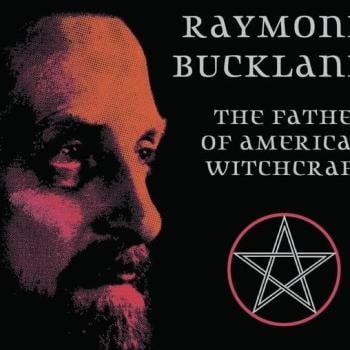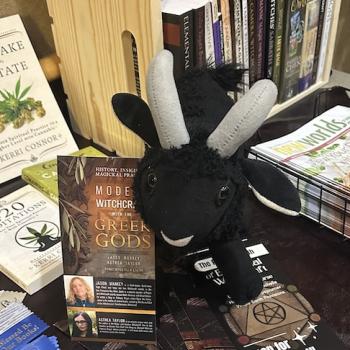I like going to Pagan festivals and conferences for a variety of reasons. Some of those reasons are social, I have a lot of friends scattered around the country and going to a festival allows me to see a lot of those friends in a short amount of time at a set location. Some of those friends tend to be local to whatever festival is happening, but at some of the larger gatherings there’s always a strong possibility I’ll be joined by people from hundreds, and sometimes thousands, miles away. (This is most likely to occur at an indoor festival, such as PaganiCon, Convocation, or Mystic South, all excellent festivals I’ve attended a bunch of times.)

My main reason for going to events is because I think they are good ways to promote the (nine!) books I’ve written over the last seven years. Presenting a workshop at an event doesn’t mean I’m going to sell ten dozen books over a weekend, but I like to think it promotes awareness of the things I’ve written, which might eventually down the road lead to some book sales. Most times I’m an excellent public speaker (as John Beckett once wrote: “If you have a chance to hear him (Jason/me) speak, go.) and doing workshops at festivals definitely plays into my strengths as a Witch-author.
Over the pandemic I slowly came to the realization that I NEEDED Pagan/magickal festivals and gatherings. Writing is a rather solitary endeavor, but being in front of a large audience gathering feedback on what you are sharing is energizing. I’m not an energy-vampire, but I feed off live workshops. They make me excited about writing and sharing research. I’m not sure I’d be able to write books without direct in-person feedback every now and then.
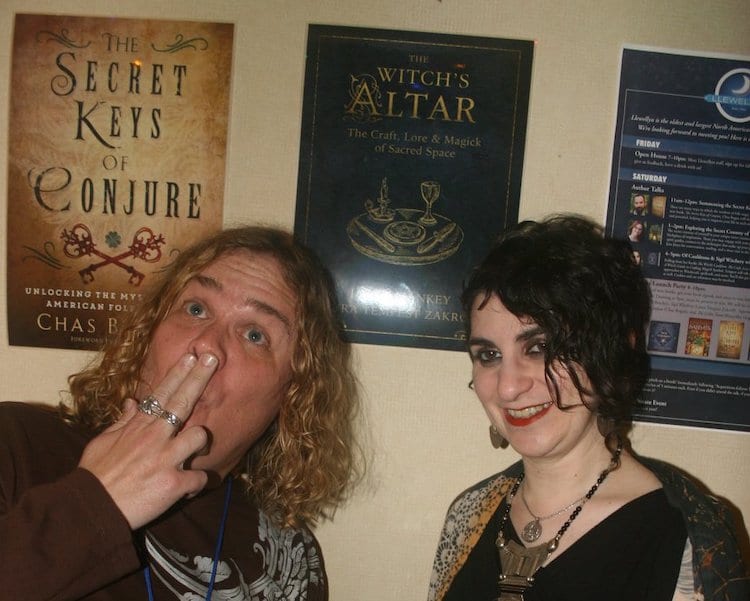
It’s also worth pointing out that workshops are most definitely work. I take them very seriously and spend a good amount of time putting them together, thinking about how I’m going to present things and what order I’m going to share information in. Most of my workshops are PowerPoints too, which means there’s a visual component for people to enjoy too. (Dirty secret though, the PowerPoints are mostly for me, they are a great way to keep my thoughts organized and not have to look down at pages of notes.) All of my friends who present workshops take those workshops as seriously as I do too. There’s also the sheer amount of energy it takes to present a good workshop, I’m going to leave it all on the floor for the group I’m speaking to!
AUTHOR PERKS? ONLY RARELY
There are lots of weird ideas out there about Pagan authors and the financial perks that come with book writing. It’s true that at about half the festivals I go to, I tend to have a large portion of my travel/room and board costs paid for by the event itself. Sometimes I will even receive a fee on top of that. This seems fair to me as presenting is hard work. I also endeavor to make myself publicly available throughout the festival in case someone wants to ask me a question or chat for a bit, which also takes energy as I am naturally a bit introverted. I often leave events exhausted and hoarse, but I always find the exertion worth it.
I also go to a lot of festivals on my own dime. Because it’s a “work trip” I can write these trips off on my taxes, but that’s a small drop in the bucket to what I’m actually spending. I don’t like having to “pay to work” (or “pay to play”) but it’s also my own choice to do so. No one has to go to a festival, it’s a choice, plain and simple. No one has ever hidden from me what I’m going to have to spend or made a false promise about expenses. Anyone suddenly acting surprised about what they have to spend is being disingenuous. We all know the terms when we sign up to do an event, many of us sign up to do them anyways.
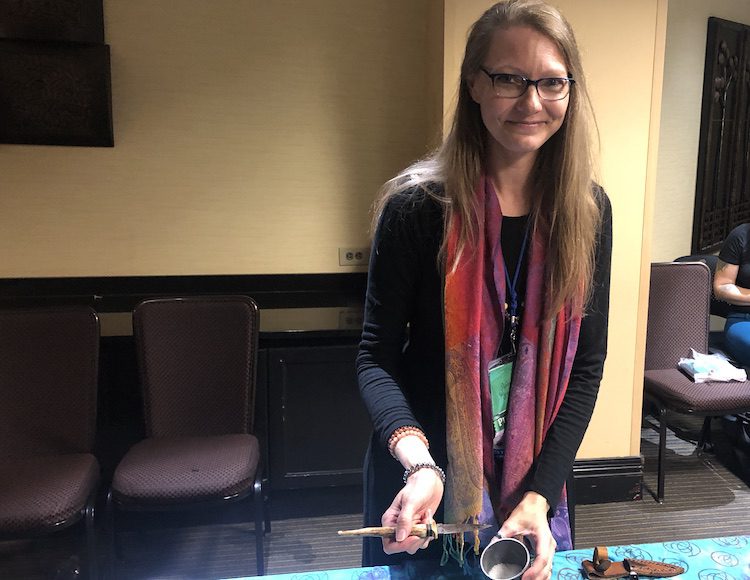
Does it hurt sometimes to feel as if event organizers don’t value my work? Absolutely. At the old PantheaCon festival in San Jose I’d often have one hundred people at each my workshops over the course of my weekend. Did I ever get a discounted admission? Nope. Especially hurtful was the fact that there were some presenters there getting such perks, and often drawing less eyeballs. Again, my own choice to go, but I’m a human being and I have emotions.
SOMEBODY PAYS . . . . . EVERY TIME
Nothing is free. If a presenter gets a free room at a hotel and free admission to the festival, the other attendees are going to end up paying for all of that. So either I pay to fly/drive to a festival or the other attendees pay for me to fly to a festival. There is no magick tree that grows money that will make those costs disappear.
The advantage of me paying my own costs is that admission to the festival I’ll be speaking at will be much cheaper for everyone else. Paying the travel/room costs of every presenter will easily result in a weekend costing three or four hundred dollars instead of one hundred and twenty. If organizers want to keep things affordable for everyone, there’s just no way to cover the cost of everyone running a workshop in most instances. I guess it’s possible that a festival could choose to focus on three or four presenters to the exclusion of everyone else. Of course that would mean a ton of work for the very small pool of teachers.
There are also very few festivals that generate much in the way of runaway profits. Most festivals make enough to cover their costs and put away a little seed money for the following year. This is especially true in the age of COVID; many festivals were shuttered over the last two years, and lost money during that period having already spent some money on events that did not happen in 2020/2021/2022.
PAY TO PLAY LIMITS WHO MIGHT SHOW UP
Using the “pay to play” model does limit who might show up at a festival or event. You’ll probably see more local speakers, and maybe less Llewellyn authors or whatever if there are no fees waived for presenters. (This is not necessarily a bad thing, many of the best Witches I know don’t write books.) Many festivals are about building local community, keeping most of the presenters local can help build those ties.
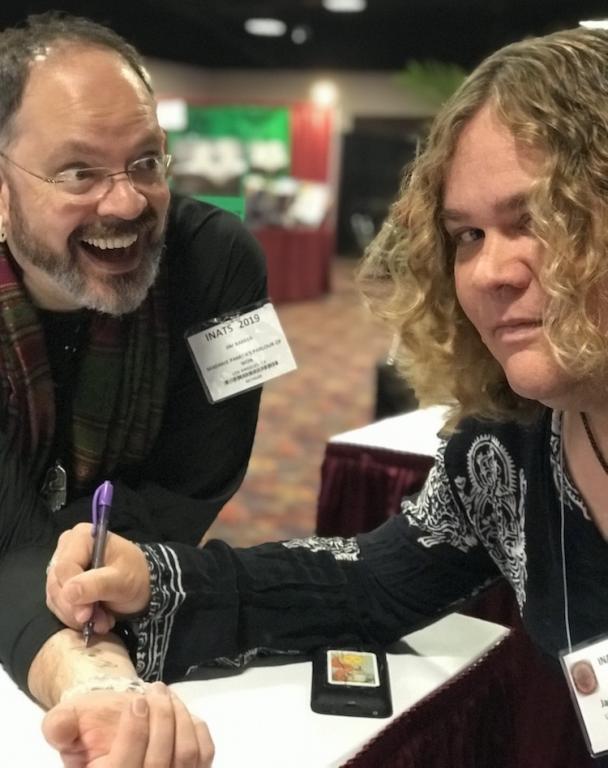
However, if you want a diverse roster of speakers that can’t be really be done with the pay to play model. Year in and year out the most racially diverse magickal festival (Hexfest) occurs in New Orleans, and that’s because it costs about four hundred dollars with taxes and fees to register for the event. You get what you pay for, and if you want more diversity, you are going to have to pay for it. (Hexfest pays for EVERY presenter’s room and travel, there is no other festival I’m aware of that does that.).
Most people can’t afford to leave their job for a weekend, all while spending a thousand dollars on airfare and hotels, especially when women and people of color tend to make less than white men. I do think there’s room in our community for more “bigger ticket” events, but I’m also grateful for events that don’t cost people 300 dollars just to get in the door. In a perfect world, we’d have a variety of both options (and everything in between).
MAKE IT EASIER FOR AUTHORS TO SELL BOOKS
I sell more books at ConVocation in Detroit Michigan than at any other event. Why? Because ConVocation operates a table for authors and charges them nothing for the service. Before Con, I have Llewellyn send a few boxes of books to Detroit. When I arrive at the event I hand the organizers an invoice and they put my books out on a table and sell them. Even better, ConVocation takes credit cards, making it super easy for people to pick up whatever they want.

This is all terrific for me in other ways: I don’t have to lug books to and from every workshop I teach, (books are heavy!) and books are available twelve hours a day instead of just the twenty minutes after I’m done with a workshop. The books are also displayed nicely and are hard to miss. I tend to always under-order so if someone in the vendor room has a few copies of something I’ve written the chances are high they might sell that too.
Another way to help authors is to limit the amount of classes in any given workshop block. I have been to some small festivals where there are always six events running concurrently. The end result is that most teachers end up with seven or eight students. This is great (sometimes) for those people taking a class, but it completely limits an author’s ability to sell anything. Instead of a bunch of concurrent workshops, perhaps more workshop slots, or shorter workshop times? I try to keep my workshops to about 70 minutes because I think that’s the maximum attention span of a lot of people. (Some festivals love two hours time slots, that’s a huge chunk of time!)
FORWARD
What can we do to build a better mousetrap? I’m certainly not going to suggest that everyone “buy a book” at every workshop they visit. That’s impractical. However, sharing that you’ve enjoyed the work of a presenter can go a long way in that presenter being asked back in the future, and possibly getting some help with the financials of attending. You could also join the presenter’s Patreon, buy a book later, or simply thank them for a job well done (when that’s the case). Nice comments are one of the most gratifying things ever! It’s not money, but it is energy, and it does help!
Most festivals will probably never be able to cover all the expenses of their presenters, but I think most events could probably help a bit more than they do. A fee or two waived, or a free hotel room can go a very long way. We should be having very real conversations about valuing the work of presenters/authors. Should some events raise prices by ten or twenty bucks to cover more expenses? Most of us do this stuff because we love it, but most of us would love it even more if it didn’t cost us so much money.








